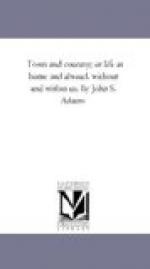The trial commenced. A deep silence prevailed, broken only by the voice of the government officer, who briefly stated an outline of the facts, to wit: “That murder and robbery had been committed; that a young man was seen hastily leaving the spot upon which the crime was committed; that the appearance of the defendant was precisely that of the person thus seen; said he should not enter into an examination of the previous character of the prisoner, giving as a reason that a man may live long as a person of unquestionable character, and after all yield to some strong temptation and fall from the standard of excellence he had hitherto attained; he should present all the facts that had come to his knowledge, tending to substantiate the charge, and would leave it to the prisoner and his counsel to undermine the evidence he presented, and to prove the accused innocent, if possible; all that he should do would be to attempt to prove him guilty; if he failed to do so a verdict must be rendered accordingly.” Having said this, he called upon his witnesses. Those who first discovered the outrage were called and testified to what they saw. John Smith was next called, and gave in as evidence what has before been stated; at the close of a strict cross-examination he returned to his seat. His son Levi was next called, and stated that his father was out the night he himself stated he was; he went out about half-past six or seven; did not say where he was going, or how long he should be out; he came home about eleven.
Prisoner’s counsel here inquired whether it was usual, upon his father’s going out, to state where he was going or when he should return. He answered in the affirmative. This was all the knowledge Levi Smith had of the affair, and with this the evidence for the government closed.
The counsel for the defendant stated, in the opening, that all he should attempt to prove would be the bad character of the principal witness, John Smith, and the unexceptionable character of the prisoner. He would prove that the reputation of Smith for truth and veracity was bad, and that therefore no reliance could be placed upon his statements. He should present the facts as they were, and leave it to them to say whether his client was innocent or guilty.




